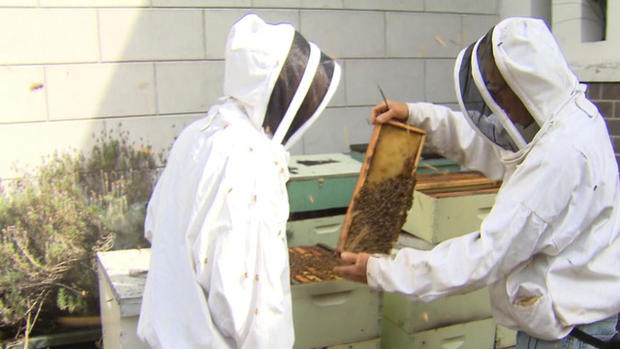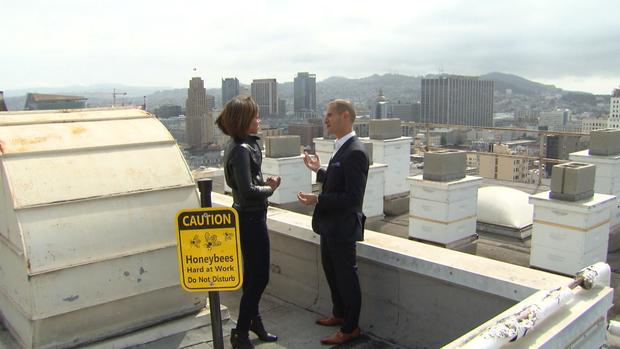San Francisco hotels become unlikely home to millions of bees
SAN FRANCISCO -- Stung hard by disease, sometimes deadly pesticides and colony collapse disorder, the country's bee population is only half of what it was 70 years ago. The epidemic reached its peak in recent years, and hotel chains around the world took note, creating an unlikely home for nature's pollinators.
The roofs of at least seven of the city's luxury hotels are home to millions of bees, reports CBS News' Danielle Nottingham.
Spencer Marshall is beekeeper at the Fairmont San Francisco, the first hotel in the city to install a bee sanctuary.
"When they came to you with this idea to put these hives on the rooftop, what did you think?" Nottingham asked him.
"Good PR, that was all. Might get a little honey, and then, 'Whoa! What's going on here?!'" Marshall said.
He said the hives on top of the Fairmont produce 1,000 pounds of honey every year.
"When they're really cooking, there can be over a couple hundred thousand bees," Marshall described.
It's a welcome change for Marshall, who's seen the now widely publicized decline of bees, first hand.
"When I started almost 50 years ago, if I lost two or three percent of my bees a year, that was like, 'What's going on?' Now you lose 50, 60 percent. And it's not sustainable," Marshall said.
When the Fairmont asked Marshall to install rooftop hives in 2010, its goal was to help rebuild the bee population. More than $15 billion a year in U.S. crops are pollinated by bees.
"Obviously the issues with the bees is a huge problem. This is definitely supporting the cause and we really feel like Fairmont is doing its part, and innovating," Fairmont marketing director Melissa Farrar said.
In 2008, the chain kicked off the trend in Toronto, developing the first onsite, hotel honeybee program in the world. Since then, at least 22 Fairmont properties have followed suit, installing hives for honey bees and bee hotels for pollinators to rest their wings.
In San Francisco, the Fairmont isn't the only hotel rooftop hosting hives.
Michael Pace is the general manager at the Clift where 10 hives, set up to mimic the skyline behind them, were installed last year.
"We're on the roof in the middle of San Francisco. It's windy; it's foggy. How do honey bees thrive up here?" Nottingham asked him.
"Actually they're doing really well. One thing bees thrive on is warmth, to get them warmed up in the mornings. So we chose this location with our beekeeper. He specifically wanted to be fully exposed the sun and the setting sun on the west," Pace said.
As the chair of the city's hotel sustainability committee, Pace wants to get every hotel in the city buzzing.
"If you have 800,000 bees on one hotel, we'll have 10 hotels by the end of this year, that's 8 million -- you've got the multiplier effect. I think we could have a very big impact," Pace said.
And where there are bees, there's honey.
Hotels are packaging their product. Chefs have found different ways to bring the honey from roof to table. Bartenders are making specialty cocktails, infused with the syrupy sweetener.
"Now to see it actually coming to life in a cocktail for me, it's just awesome," Pace said.
At the Fairmont, beekeeper Marshall welcomes the skyline hives. He thinks it's "absolutely" a good model to carry out throughout the world.
"Just exposing people to bees ... and the more places they can exist, the more chances are we can evolve," Marshall said.
And Marshall hopes this new urban habitat is just the "bee-gining."


